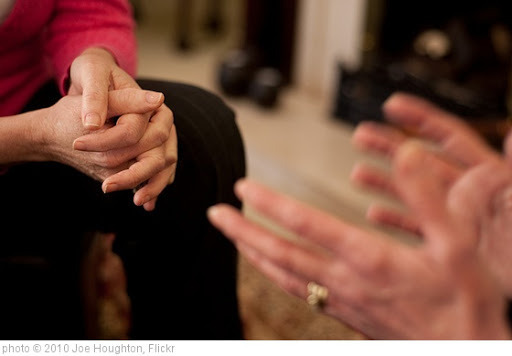Sheila Wray Gregoire's Blog, page 243
April 2, 2013
How Do I Forgive My Husband?
 I get the emails or comments on this blog all the time: “My husband confessed he uses porn, and I can’t get past it. How do I forgive him?” Or “my wife had an affair and I can’t see my way through this. How can I ever treat her normally again?”
I get the emails or comments on this blog all the time: “My husband confessed he uses porn, and I can’t get past it. How do I forgive him?” Or “my wife had an affair and I can’t see my way through this. How can I ever treat her normally again?”
Forgiveness is hard.
A while ago I reviewed Vicki Tiede’s book When Your Husband is Addicted to Pornography, and she said something very interesting about forgiveness. In essence, she said that God does not ask us to forgive in a way that He does not. He asks us to forgive AS He forgives. And how does He forgive? He forgives fully and graciously, but only when people repent and turn to Him. He doesn’t forgive everybody.
1 John 1:9 says:
If we confess our sins, he is faithful and just to forgive us our sins, and to cleanse us from all unrighteousness.
The confession comes before the forgiveness.
Jesus’ blood covers everyone’s sins, but it is only applied to those who repent. And if that’s how God forgives, then God does not ask us to forgive lightly, either. God does not say that if someone confesses a sin, but doesn’t really turn from it, or doesn’t really have any intention of changing, that we need to forgive.
I thought about that long and hard, because that’s quite contrary to what I’ve normally thought about forgiveness. Yet Vicki makes a good point.
She says that “cheap forgiveness” can do more harm than good.
Let’s say a guy is addicted to porn, for instance, and his wife finds out. He acts all contrite because he knows he’s in trouble, and asks her to forgive him. She does, because she feels that she has to, and so she tries her best to treat him exactly the same as before. He goes on sneaking around behind her back again because there is no need to actually change.
God wants us to do the hard work of healing and repentance, and if we offer forgiveness quickly, when there is no change of heart, we take away the need to do that hard work.
I agree with her. I do. And yet I was uncomfortable with this line of thinking. I have tended to think of forgiveness as something we offer partly for ourselves. We grant forgiveness because it frees US. We can’t carry around this anger anymore, and we can’t live always tied to something from the past. We need to walk forward with God.
Perhaps much of this problem is that we mean so many different things by the word “forgiveness”. Vicki was using it to mean a fully restored relationship: you cannot have a fully restored relationship if there has not been a change of heart from the one who has done wrong. Reconciliation demands true honesty and repentance.
But there is an element of forgiveness that does not depend on the other person, and this is how I’ve come to see it:
To me, forgiveness means taking the hurt, no matter what it is, and placing it in God’s hands and saying: I don’t want it anymore. Take it from me. I leave it to You to bring justice. I leave it to You to work out dealing with my offender. I leave it to You to fight for me. As for me, I will walk forward, with this left behind me.
That’s saying, “God, I believe that you are a just God who loves me and will go to battle for me and will work out your purposes for me and for this person, and so I trust you. I’m not going to try to manipulate the circumstances or extract an apology or demand restitution. I’ll leave it all up to you, and I trust you with it.”
Forgiveness is really more a matter of trust than anything else.
 And forgiveness is about letting go. When I walked through the whole forgiveness process with my father, who left when I was very young, I had to come to terms with the fact that he would never apologize, because he didn’t really understand what he had done. He did not get the magnitude of how much he hurt me. And I realized that a part of me was hanging on to the dream that one day he would sit down and spill out all of his offences, and apologize for them, and ask me to forgive him. Forgiveness, though, means letting go of the dream that he will one day ask that. Forgiveness means putting that dream in God’s hands. God will be the One to fight for you. There is justice, and God will work it out. Perhaps the person will come to repentance and will claim Jesus’ forgiveness. And perhaps they will not. But regardless, God will go to bat for you. You don’t have to. And if we let go of this dream of an apology or acknowledgement of our hurt, then we can move forward.
And forgiveness is about letting go. When I walked through the whole forgiveness process with my father, who left when I was very young, I had to come to terms with the fact that he would never apologize, because he didn’t really understand what he had done. He did not get the magnitude of how much he hurt me. And I realized that a part of me was hanging on to the dream that one day he would sit down and spill out all of his offences, and apologize for them, and ask me to forgive him. Forgiveness, though, means letting go of the dream that he will one day ask that. Forgiveness means putting that dream in God’s hands. God will be the One to fight for you. There is justice, and God will work it out. Perhaps the person will come to repentance and will claim Jesus’ forgiveness. And perhaps they will not. But regardless, God will go to bat for you. You don’t have to. And if we let go of this dream of an apology or acknowledgement of our hurt, then we can move forward.
Recently I was out with a young friend of mine who had been a victim of a violent random attack. She’d been skittish since this happened, and had experienced a difficult time processing it. We were just chatting about nothing in particular, but I was in the middle of writing the review for Tiede’s book, so I was just talking out loud about some of these thoughts. And I told her what I was thinking about forgiveness: it’s not saying it didn’t matter, and it’s not saying we’re best friends now. It’s just putting the whole thing in God’s hands and letting Him deal with it. It’s letting go of the need or dream of any apology or acknowledgement because you know God will handle it. And it’s turning away from it and walking forward.
A few weeks later her mom called me and said, “I don’t know what you said but she’s been so much LIGHTER.” That made me lighter, too.
I think in marriage that this can be the hardest thing. We want the other person to pay. We want them to list out all their sins in great detail and grovel. And yet I believe the proper model is that if there is true repentance, which is always accompanied by confession, not secrecy, and by a dedication to work hard to ensure that it doesn’t happen again, then you let it go and are fully reconciled. If there is not that repentance, and the sin is one that could seriously endanger the marriage (like adultery, or addictions, or porn), then you act smart. You draw boundaries. You do not become fully reconciled yet.
But you also leave it to God. You don’t punish them. You don’t demand. You don’t play scenarios over and over in your mind where your spouse humiliates himself or herself before you. You hand the offense over to God and ask Him to take care of it. You let go of the need for that sin to ever be fully acknowledged, or to ever receive a full apology. That’s what that waiting period means: you trust in God to take care of it. And in the meantime, you act in love, but also in wisdom, not reconciling when there isn’t full repentance, but not living trapped in this sin, where everything in your life revolves around your anger and your need for restitution.
Forgiveness, then, is not so much about the sin as it is about trust in God.
And that’s hard. It’s so, so hard. But it’s also so freeing.
What have you found? Have you ever had to forgive and leave something in God’s hands? Have you ever had to let go of the dream of a full apology?

31 Days to Great Sex is here (only $4.99!) It's the best $5 you'll ever spend on your marriage!
Learn to talk more, flirt more, and even explore more! You'll work on how to connect emotionally, spiritually, AND physically.
Find out more
April 1, 2013
Before You Give that “Helpful Suggestion”–Check Yourself

I was on a high. I had just returned from a week of speaking engagements where God had really used me. I had prayed with women, and they had experienced some major breakthroughs. People had recommitted their lives to God. They had confessed sin in their lives. Several had come to Christ. And marriages had been turned around.
Then I came home and there was an email from a “concerned reader”. He had been reading through my blog posts, and felt that I wasn’t presenting Christ in a good light. His email was very thought out. It was even gracious. He was simply worried about my witness. He wanted to warn me.
It threw me through a loop. Do I present Christ in a bad light? Am I a bad ambassador for marriage?
After feeling rather depressed, and wondering again if I even have a right to speak, God spoke to me, and said, “Did you do what I asked you to do last week?” Yes. “Did I move?” Yes. “Then don’t allow someone else to derail what I have called you to do.” So I looked for any element of truth in his email and deleted it.
I see similar things on Facebook all the time. Someone asks for encouragement, and a virtual stranger will give a pat “you’re not praying enough” answer. Or they will say, “I need to warn you, in Christian love, that you are guilty of pride here” or, “I need to warn you that you are going off track.”
That’s how discouragement is often couched: “I need to warn you…” “I’m just concerned…” “I’m worried about you….”
And how does this “concern”, or this “worry”, affect the person?
It usually makes them feel lousy.
So let me ask you: Does God usually make you feel lousy? If not, then likely that “concern” wasn’t from God either.
Don’t get me wrong; I firmly believe that we should be holding others to account. I firmly believe that when we see someone that we know and love going off track, that we are to warn that person. But the key is that we should warn SOMEONE WE KNOW AND LOVE, not just someone we THINK we know because we know them online, or because we know them a little bit in church.
Think about it this way: if someone is being used by God, or if God is doing a major work on a person’s heart, what is the best way to derail them? It’s to have a fellow Christian come up beside them and say, “I think you are going off track.” It’s not to have a non-Christian say something snarky (though that hurts, too), or to have bad circumstances in your life (though those often can derail us, too). No, the most damaging thing is to have someone come and cause us to doubt what we have heard from God, or to doubt our ministry.
That’s why I firmly believe that if you are concerned for someone, you need to ask yourself these questions before you say anything:
1. Do I know this person PERSONALLY? Do I have an accountability relationship with them?
If the answer is no, you likely should say nothing. I, for instance, am surrounded by people who know me, who know my kids, who know my husband. I’m accountable to my church leadership. I’m accountable to those at FamilyLife Canada that I work under. I’m accountable to my family members, who know what I am doing and pray for me. I’m accountable to the group of parents at my church that I serve with as we minister to our youth. I’m accountable to my husband. I have a ton of people who know the complete picture, and if I’m erring, they are there to help me. Because they see the whole picture, they are the ones whom God has called to hold me accountable.
And this is true for virtually all writers and bloggers. I’m using myself as an example, but I’m actually not primarily thinking of myself. I know a very well-known author on a personal level who has been very hurt by many emails this year from “concerned readers” who are worried about her walk with Christ. I don’t think people realize how much such emails cause people discouragement–people who already doubt their calling, because writing and speaking are difficult things.
If you are worried about someone’s walk with Christ, pray for them. But if you are not in an accountability relationship with them–where they are accountable to you, but you are also accountable to them–then it is likely not your role to correct them. Trust that since God has put so many people around them, that if the person needs correction God will tell someone who IS in a position of accountability with them to help them see that.
Or to put it another way: examine your relationship with the person you want to correct, and then ask yourself, “is it possible that God would put all kinds of people around this person, but not a single one of them would hear God asking them to correct him or her? Is it possible that God needs to ask me to do it because all of the people who actually are in the right position to do it aren’t hearing from Him?” If you still really believe that’s the case, then fine, say something. But I highly doubt it. When someone is in ministry, and they need correction, there are always people alongside them whom God can use. It is very, very unlikely that He would choose to use a complete stranger to that person.
He uses strangers to encourage us all the time (thank you so much for those emails!), but I can’t think of a single time of anybody that I know where God has deliberately chosen to use a stranger rather than someone who is actually in an accountability relationship with that person to send a message of correction. Yet I can think of so many times that words from strangers have been used to derail and demoralize and degrade.
In the Bible, when God sends prophets to correct kings, it’s because there was no one surrounding the king who really did know God. Before you reach out to that politician or writer or speaker, then, ask yourself–are there REALLY no Christians around this person?
2. Do I Know All of the Facts?
Occasionally I’ll post something that I think is funny in a column, or in a Facebook post. It’s just a throwaway line that 99% of the population would consider a joke. But then you’ll get someone commenting, “I need to tell you in Christian love that you are presenting Christ in a negative light.”
Ask yourself before you say something like that, “By posting this publicly, is it possible that I am the one presenting Christ in a negative light?” When people overreact to what is obviously a joke, then seekers get the impression that Christians really are killjoys. You may not appreciate it, but ask yourself: by bringing negative attention to it, am I making it worse, or better?
I’ve been an instrument of discouragement in someone’s life, too, because I didn’t know all the facts, to my everlasting shame. I was involved in a church where people meant well, but too many things were being done in counterproductive ways, and people were getting hurt or sidelined. And I stepped into the middle of it, writing a big letter explaining why we had decided to leave. I felt justified; I felt relieved to get it off of my chest. But I didn’t know the pressure the pastor was under from the board. I didn’t know what was going on behind closed doors. So I put this pastor in an even more difficult position, and he had been a friend of mine.
I still believe that everything I wrote in that letter was right, but it was completely unnecessary to send it. And by sending it, I discouraged a couple who were dedicated to serving God. Now we’ve rebuilt that relationship, and our kids are still friends, but I try not to get in the middle of things anymore, because the truth is you often don’t know what’s really going on.
3. Have I Examined My Own Heart?
In my case, I should have examined my heart and seen the pride there. It wasn’t about being right; it was about whether or not saying this would advance God’s purposes or not.
When we’re talking about criticizing online, we also need to look at our hearts. Why is it important to you to reach out to this person that you don’t really know? Why is it important that you correct him or her?
I read tons on the internet that I disagree with, and when I do, I either leave a polite comment giving my perspective, or I move on. I don’t feel the need to correct everyone that I think is wrong.
There is nothing wrong with disagreeing in the comments; on this blog, I leave the comments open for just that reason (although I do reserve the right to delete comments that I fear will put Christ in a negative light, or that will encourage behavior that I feel is sinful). But honest disagreement is fine.
What I don’t like is when commenters start to question each other’s faith, or start to question mine. That is simply not our role online. And I’ve been concerned lately about how some commenters on this blog are treating other commenters. You don’t know anyone’s full story, so please, let’s not assume things about each other. Let’s give each other grace and not make pronouncements on either their faith or their job as a wife/husband.
Yes, we have an online community for discussion. Yes, that community can become a place of accountability if we get to know each other well (as I hope people will in my 6-week course). But on the whole, accountability is for people who know our complete life, not just our online persona.
And so let me caution you before you leave a “I’m just concerned about you…” comment on Facebook for someone, or “In Christian love, I must tell you that you’re wrong…” It is very easy to be used as an instrument of discouragement. And many, many people, who believe they are acting “in Christian love”, are doing exactly the opposite. They are becoming instruments of discouragement to people who are serving God, and to people whom God is doing a major work in their heart. When God is moving, the enemy gets scared, and he looks around for ways to derail someone. And the easiest way to do it is to use a Christian. Do not be that person!
I have seen pastors quit the pulpit over this. I have seen bloggers stop blogging. I have seen speakers stop speaking and writers stop writing. We discourage each other all the time, thinking that we are doing it “in Christian love”, when we do not know all the facts, we do not see the complete picture, and we aren’t in an accountability relationship with the person.
The online world makes it even easier to do this, and it needs to stop. Please, don’t give pat “you just need to pray more and have faith!” answers to people who are really hurting. Don’t give “you aren’t reflecting Christ well” to people who are standing up there everyday and taking a stand for Him, even if it’s not the way you would do it. Just don’t.
Let’s examine our own selves, and then grow in closer accountability with those around us in real life. That’s a far healthier way to correct each other and encourage each other, and it’s far harder for us then to become instruments of discouragement in someone’s life.
Have you ever been an instrument of discouragement? Or has someone ever discouraged you? Tell me about it in the comments!
Don’t forget–Just one week until The School of Intimacy launches!
Watch a quick video of me explaining why I’m passionate about this course. And then enroll now!
Related posts:
Teenage Relationships in the Age of Texting
Monday Musings
Wifey Wednesday: 10 Not-So-Helpful Things To Do for Your Spouse




March 30, 2013
Great Reads for the Easter Weekend
 Hello, all! Are you enjoying your Easter weekend? I’m actually heading to Ottawa today to look for houses. My oldest daughter is heading off to university in the fall, sharing a house with two other girls. So we’re out house hunting today! It’s bittersweet; she’s so ready to be off on her own, and I’m so very proud of her. But I’ll also miss her tremendously. Thank goodness for Skype!
Hello, all! Are you enjoying your Easter weekend? I’m actually heading to Ottawa today to look for houses. My oldest daughter is heading off to university in the fall, sharing a house with two other girls. So we’re out house hunting today! It’s bittersweet; she’s so ready to be off on her own, and I’m so very proud of her. But I’ll also miss her tremendously. Thank goodness for Skype!
For those of you who are at home this weekend, though, and are settling in to a peaceful weekend, I thought I’d share some great books that I’ve devoured recently.
Grouchy O’Malley Learns About Love, fun Children’s Book
If you’re like me you struggle with Easter chocolate. Those Cadbury cream eggs are SO good, and a chocolate bunny never lasted very long in my home. But at the same time, it seems a bit of a distortion of the real Easter message–something designed to distract us from the wonderful good news that He is Risen, and we are forgiven.
When the girls were little we never bought very much Easter chocolate. They always got a bunny from Grandma, but it just wasn’t emphasized. Maybe you’ve found a more creative way of dealing with it. Teresa Gearing has written a lovely book for children that gives the Easter story–with the bunnies–a new twist. Available on Kindle, it can jumpstart conversations with your kids about the real meaning of Easter and The Resurrection.
Grouchy O’Malley is old. Really old. And he’s really grouchy. He lives on a big farm where he has an abundance of everything, from apples to bunnies. He eats the apples and nuzzles the bunnies.
Young Connor watches on, hungry. He and his mother don’t have great variety in their diet, and he offers to trade labor for food. O’Malley decides to take him up on it, and slowly but surely the two develop a friendship. Through that friendship O’Malley also learns about Jesus, and the knowledge changes his life. Teresa does a good job at telling the gospel message at a level that children can understand.
The book has some bittersweet moments, but children understand about loss. And in the end, there’s a twist with the bunnies and the Easter baskets that can help remind the kids why we really celebrate. So if you’re looking for an Easter story to read to your children tonight, this is a good one to choose!
Fatherless, by James Dobson and Kurt Bruner (Novel That Makes You Think)
My internet friend Kurt Bruner (I’ve never met him in real life, but we’ve helped each other out with writing articles, etc.) co-wrote Fatherless with James Dobson. It’s the first of a dystopic trilogy–a dark look into the future if current trends continue. It was engaging, riveting, and sobering.
It’s 2042, and the population has reached a tipping point. People have stopped having babies, and there are no longer enough younger people to care for the older ones. The economy is stagnant. Marriage is almost non-existent. And those who choose a more traditional lifestyle are derided and thought of as uncouth.
The crushing economy has ushered in new cost saving measures that are sold as “humanitarian”, the worst being “transitioning”. People can choose euthanasia, even if they aren’t terminally ill, in order to save the state, and their families, money. With so many people only having one child, or no child at all, and with the state having little money for nursing homes, it makes the most sense for older people to decide to stop being a burden.
In fact, it makes so much sense that an 18-year-old severely disabled boy decides he should “transition”, too, much to the horror of his mother who is too late to save him. And thus begins this look into an all-too-plausible future.
Look around us: people aren’t getting married in as large numbers. We no longer value children. More and more couples are remaining childless. We don’t value the elderly. And the economy is collapsing. How can we keep caring for all the older people if there are so few younger ones? It’s all going to come back to haunt us.
The hero of the book is an unlucky Congressman who is trying to inject some Christian values into legislation. By studying “bright spots” in the country, where the economy is still growing, he finds that the healthiest places are those where people are still having children, and where fewer “transitions” occur. Yet he can’t sell his vision to his peers, and the book ends with him in the midst of a personal and family triumph, but a political failure. Fatherless is the first in a trilogy, and I’m eager to see what comes next.
On a side note, I really appreciated how Dobson and Bruner handled the more personal aspects of the couple’s marriage. There was nothing graphic or titillating, but at the same time, they didn’t shy away from showing the couple being appropriately intimate. It was a refreshing change in Christian literature.
True confession: I used to be totally addicted to political blogs, and read them voraciously daily. I’ve stopped in the last few months as I found I was getting so disheartened and so discouraged. I’ve decided to focus my energies where I think I can actually make a difference: by encouraging people’s marriages. But I do find books like this so fascinating, because it sounds straight out of the news. And what scares me the most is how believable their world of 2042 actually is.
Get Fatherless here.
Unrivaled, by Siri Mitchell (Fun Novel!)
 I really love Siri Mitchell. My youngest daughter calls books like this “hair books” because basically she buys them for the women’s hair on the cover. And all Christian romances always show women with great hair.
I really love Siri Mitchell. My youngest daughter calls books like this “hair books” because basically she buys them for the women’s hair on the cover. And all Christian romances always show women with great hair.
I was sent another new release romance to review, and while I read it I’m not going to comment because I just didn’t like it. There aren’t very many Christian romances that pass muster with me. Too many have characters that are too perfect; they follow Jesus and everything goes well and they never have an evil thought and the worst thing they do is gossip. It never seems real to me.
Siri Mitchell shows real characters, and I appreciate that.
Lucy Kendall’s dad is a genius at making candy, but pathetic at making money. And so he lost the rights to Royal Taffy, an amazing candy he created. Charlie Clarke’s dad swindled those rights away. And now Lucy has to figure out a new recipe for candy that will take the world by storm to rescue her dad’s company. But at the same time Charlie is trying to show his worth to his own father. Can these two rival candy-makers make peace?
I absolutely love the world she creates. She lets you in to the early 1900s when industrial espionage was common, and when modern marketing campaigns were just beginning. Just reading the book makes you hungry.
But my favourite character was a minor one, just a friend, who always said exactly what she was thinking, and cut through all the excuses and justifications both Charlie and Lucy made for their own wrong actions. She points them both to Jesus in an unobtrusive and yet matter-of-fact way. I wish I could speak as she does. It was inspiring.
My complaint, as with most romances, is that they end at the wedding. Just like with Austen’s books I always want to see what comes next, because to me that’s when it gets really good. It’s after the wedding that all the trouble often starts, and it’s after the wedding that you discover what real love is. But nevertheless, I still enjoyed this book, and I think you will, too. The characters are not perfect. They struggle with what’s right and wrong, and make plenty of bad decisions. The Christian element of the book is real and not formulaic. If you’re looking for a relaxing way to pass the weekend, pick it up!
Unrivaled has been provided courtesy of Baker Publishing Group and Graf-Martin Communications, Inc.
Available at your favourite bookseller from Bethany House, a division of Baker Publishing Group

Related posts:
The Old Is New Again
He Is Risen!
Weekend Round-Up




March 29, 2013
The Good, the Noble, and the Heroic
 Every Friday my syndicated column appears in a bunch of newspapers in southeastern Ontario and Saskatchewan. This week’s is about finding the truly heroic in the “me” culture.
Every Friday my syndicated column appears in a bunch of newspapers in southeastern Ontario and Saskatchewan. This week’s is about finding the truly heroic in the “me” culture.
What’s so good about Friday? I don’t mean good in the TGIF sense, but rather, why do we call this particular holiday Good? In the Christian tradition, it’s the day that Christ offered up His life as a ransom for many, paying the penalty for sin. Yet while this should be considered good, I sometimes worry that our culture fails to recognize the truly good, the truly noble, the truly heroic in its midst.
When I was a little girl in school World War II was only thirty or forty years in the past. That made it a looming force in our culture, and so much of my novel reading and thinking between those important ages of 8 and 15 centred around World War II. We studied it in school. We met Holocaust survivors in assemblies. And I always wondered: would I have hidden Anne Frank? Would I have rescued Jewish babies out of Germany? Regular people acted heroically then, at great cost.
Dietrich Bonhoeffer is one of my heroes. Arrested for opposition to the Nazis, he was executed in a concentration camp two weeks before Germany capitulated. Yet his life, though cut short, still speaks. He was determined that his life would matter–that he would not watch injustice and do nothing, but that he would take whatever action was necessary to make a difference. He said that our role is not simply to “bandage the victims under the wheel, but jam the spoke in the wheel itself.”
Emma Sky is a British anti-war activist who determined to live out this principle. She traveled to Iraq to protest Western involvement. Yet when she arrived, she spent time with U.S. troops and was tremendously impressed with their dedication and their commitment to bettering the lives of the people there. She ended up staying in Iraq, serving as civilian governor in Kirkuk and acting as advisor to key U.S. generals. She met real heroes, and it changed everything to her.
Today the military is one of the few avenues that offer up that example of real heroism, because in our everyday lives we don’t tend to live with threats of violence. Perhaps that’s why stories of mass shootings rivet us: we’re mesmerized by the horrific tragedy, but we’re also entranced because inevitably some become inadvertent heroes. Someone who woke up that morning, who had their cereal like everyone else does, who ran out the door breathless, a little bit late, in a split second made a decision that cost them their lives, but saved others. An ordinary person does something extraordinary.
Isn’t that always good news, even if it’s intertwined with tragedy? Isn’t that what the human condition yearns for: a chance to transcend the everyday ordinariness of our quest for a better life, and instead see someone doing something selfless–something that enlarges the soul and makes our world that little bit less shallow, and much more meaningful.
Self-fulfillment is our god today. We need to find ourselves, chase after happiness, and be true to our feelings. We are to toss aside that which makes us unhappy or guilt-ridden, and instead seek to maximize our own enjoyment. That, apparently, is the key to a good life.
Yet that does not sound terribly good to me. Sure, you can dress it up in pretty language and make it sound noble to be “true to oneself”. But that which is truly noble must also be truly selfless. And deep inside, we all know that. I want to live in a world where the noble and the heroic are still celebrated, and this week, for a time, they will be.
For greater love has no one than this: that he would lay down his life for his friends.
Don’t miss a Reality Check!
Sign up to receive it FREE in your inbox every week!
Related posts:
Herod Was Not a Hero. Was He?
Happily Ever After Generation
Letting Go of the Fairytale




March 28, 2013
Welcome to the New To Love, Honor and Vacuum!
So what do you think? Do you like the new blog design?
I was just tired of pink. And I wanted something simpler to navigate. So my wonderful assistant Holly and I have been going back and forth on a new design for a while now, and she uploaded it last night.
I’ve been playing around with some things all day, and trying to streamline more, but at least it’s readable now!
There are still a few kinks we’ll work out over the next few weeks, but I’m happy. I think it feels more like me!
(Incidentally, here’s another post where I talk about new things: Turning Junk Into Something Beautiful.)
I’m gearing up for Easter weekend and I’m so excited. I love Easter. Just the hope and the wonderful music and the PEACE. And Lent is over! He is risen indeed.
What do you do to celebrate Easter? Let me know in the comments. I’ve always had a love-hate relationship with Easter chocolate, because it seems like the chocolate hunts take away from the main message. But I do love chocolate eggs.
I’ll have my Good Friday column up tomorrow, but then I likely won’t talk to you again until after Easter. I hope you have a lovely weekend!
Deal of the Day
 Have some downtime this Easter weekend and want to learn a new craft? I love Craftsy’s online courses. You just watch a high quality DVD and you learn so much.
Have some downtime this Easter weekend and want to learn a new craft? I love Craftsy’s online courses. You just watch a high quality DVD and you learn so much.
My Craftsy Wish List:
1. Knitting With Beads
2. Project Upcycle: Thrifty Sewing Projects
3. Art Quilt Backgrounds: Beyond Log Cabin
Check out all of the other great Craftsy Classes by clicking here.
Related posts:
Getting to Know Some To Love, Honor and Vacuum Readers!
A Few Quick Things About To Love, Honor and Vacuum
To Love, Honor and Vacuum May in Review




March 27, 2013
Wifey Wednesday: Don’t Be in the Dark About Your Family’s Finances
If tonight tragedy were to strike, and your husband were to be in a car accident, would you know where to find your insurance information? If a fire struck, would you know where your house content insurance policy is? Do you even know if you have one?
Or, when you go and take money out of the ATM, do you know how much is available? Are you short on cash, or is it okay to treat the kids to an ice cream while you’re out?
Too many women don’t know the answers to those questions.
My friend Holly tells her story:
My husband and I went through bankruptcy in March 2009, due to so many factors, like job loss, housing market crash, the economy and our own foolish choices. During that time, my husband took over all things financial to shield and cover me from the stress of it all. It was a good thing for a time. When we began to end our three years of bankruptcy, I (a business major) was ready to take the bills over again. For a whole year I asked him to hand them back over, and even had my prayer group praying, but he delayed.
Little did I know that he was doing his best, but was still very behind. Truly, he was shielding his bride still from the strain of what we owed and the discouragement of not having enough to pay it all. One day, a very timely day, we received notice of foreclosure unless we paid by a certain time. I was completely surprised! My husband said he was so sorry (and truly, he was). My choice then was to get back to back with him, as a team. We now are paying back extra on our mortgage with a plan that is hard-pressed, but do-able. AND we are doing the bills together every week. There’s a reason why two are better than one. If one falls down, the other can help him (or her) get back up again.
(you can read more of her story here).

A few weeks ago I posted a Reader Question which asked: Help! My Husband Doesn’t seem to care about the finances. Many couples have a financial mismatch. One person wants to know where the money is going, and the other prefers to have his or her head in the sand, believing that “everything will work out fine in the end”.
That is extremely irresponsible. And if your husband tells you that he has everything under control, but you have no idea how to locate anything financial, and you have no idea about your net worth, that is extremely irresponsible, too.
You are a team.
It’s fine if one person does the finances and pays the bills and figures out how much money you have. But the other person still needs to know what is going on.
Saying, “well, he’s the head of the family, and he says he has it all under control, so I need to trust him” is just wrong. Let’s look at why:
1. Scenario A: He’s Being Perfectly Responsible with the Money, but Something Happens to Him
He’s paying the bills. He’s socking money away for retirement. He has good investments. All the insurance premiums are paid. And one day something happens to him.
Those life insurance policies don’t pay automatically. You have to claim them. You don’t have access to bank accounts you don’t know about. You can’t take money out of a bank account you’re not named on. You can’t pay off credit cards you don’t know about. If he’s responsible, but you don’t know where anything is or what you have, you could still end up in a huge mess. And if you’re grieving, do you really want to worry about all of that financial stuff, too?
I’ve even known couples where she didn’t have a bank card or a credit card; he gave her a cash “allowance” every week, and it worked fine. But then one day he ends up in the hospital and she has no access to any of their money. This isn’t responsible. It isn’t safe. And it’s treating her like a child, not like a spouse. Both spouses must have access to everything.
2. Scenario B: He’s Isn’t Being Responsible, But He Isn’t Cluing You In
Maybe he doesn’t understand how debt works. Maybe he’s embarrassed that his income isn’t covering your expenses. Maybe he just finds it stressful, and he’d prefer not to think about. So he’s letting some bills go unpaid.
And then one day he comes to you sheepishly and says he needs you to come down to the bank and refinance your mortgage together. They need your signature, and he’s gone so far into debt that he needs to take out a second mortgage. Or something happens to your house and only then do you find out you didn’t have contents insurance. (You really need both house insurance AND contents insurance. Don’t forget the latter, even if you rent. Get a contents insurance quote here).
Of course other scenarios also play out: maybe you’re doing the finances and he doesn’t want to hear about it. Maybe he’s spending too much but he doesn’t want to stop. These things can drastically impact your marital harmony and your future.
So let me list a strategy to make dealing with finances as a team easier.
1. Whoever does the finances also prepares a “status update”
Whoever pays the bills emails or prints out a status update twice a month of how much is in the bank, how much you owe, and how much you have. It doesn’t have to be elaborate–just a snapshot so that you both know how tight money is–or isn’t.
As a commenter pointed out in that finances reader question, if the only time you ever talk about money is when there isn’t any and when you’re stressed, then it becomes difficult to talk about. It’s seen as an attack on his ability to provide. But if you consistently update each other every two weeks, then it’s not an attack. It’s just a “keeping you in the loop” so we can plan together and act as a team. That’s good!
2. Take Care of Must Haves first
Some things are negotiables. You don’t need satellite TV. You don’t need your kids in soccer. You don’t need to eat out, to hire a maid, or to buy new clothes.
But there are some things that are NOT negotiable. Every family needs them so that if something happens you’re prepared. Here are what I consider non-negotiables:
1. House Contents Insurance and House Insurance
We often think of house insurance, but do you have the contents insured? If you don’t have proper coverage, look up home insurance quotes. And make sure your home insurance/business insurance policy offers liability insurance, too. It is too risky not to have this kind of coverage.
2. Disability Insurance and Life Insurance
We all know life insurance is important, especially if you have one main breadwinner and one person who stays at home. If someone dies, you want to be able to continue to care for your family, not suddenly have to find a well-paying job at the same time as you’re grieving.
But did you know that disability insurance is even more important? It’s far more likely that a bread winner will be disabled for a time than actually die. And disabilities are also expensive. Please, don’t scrimp on this!
3. Health Insurance
Depending on what country you’re in, you need this. Make room in your budget, even if it’s tight.
4. Wills
If you have children, and you don’t have a will, and something happens to you, do you really want your friends and family members going to court over who gets the kids? What if you were hoping that your sister would raise them, but your husband’s mother really wants them? You need a will, or else the state will decide who raises your kids, not you.
5. Emergency Fund
Every family needs an emergency fund of about 3 months’ income to tide you over if something happens–job loss, injury, massive unexpected expense (need a new roof, new furnace, new car).
3. Budget Together
Once you have the must-haves taken care of, decide together where the rest of your money will go, and how you will pay off debt. If he’s the one doing the finances, that doesn’t let you off the hook in terms of budgeting. You need to do your share, too, and that includes sticking to what you’ve agreed is the right course of action. But it also means that you must have input into what that budget is. I have known so many women, like Holly, who thought their financial situation was fine, so they bought things they never would have purchased had they known how far into debt they are. So both of you go over this and decide together where your money will go and what your priorities will be.
It gets me so frustrated when I hear women talk about finances as if it’s a submission issue; I just need to get out of the way and let him pay the bills because he’s the man, and if he fails to pay the electricity bill for a few months and the lights get turned off, I still won’t say anything because I need to submit.
No, ladies, you’re a team! And maybe you’re the one who is more gifted at finances than he is! What you need to do is to have a conversation about this and talk about how you can be a team. Who is best equipped to handle the finances? Who wants to handle them? And then what procedures can we put in place to make sure that the spouse who ISN’T doing the finances still knows where the insurance statements are, where the wills are, where the bank statements are, and what we owe.
This is a fundamental part of marriage.
Sometimes we think of marriage too much in hierarchical terms and not enough in terms of a team. And finances are where you must be a team, or else you too easily could be working at cross-purposes and putting each other at risk.


If you’re really struggling with debt, or you just want to get a handle on how to budget and how to save, my favourite resources are:
Dave Ramsey’s Total Money Makeover (only $13.49, and such a great resource)
Dave Ramsey’s Starter Kit: Includes Total Money Makeover, some DVDs, and starter Envelope system
And remember that one way to save money is to make sure you’re not paying too much for those non-negotiables! Buy software to prepare your own will. Shop around for a buildings insurance quote or health insurance quote.
But please, ladies, whatever you do, be a team. Don’t stay in the dark. Yes, finances can be scary. Yes, insurance can be complicated. But this is something you can’t afford to ignore. Talk about it, and make a plan to deal with it. Two are always better than one.
Now, what advice do you have for us today? Link up the URL of a marriage post in the linky below. And be sure to copy the code for the Wifey Wednesday button and link back to this page, so that other people can see the great marriage resources, too!
I was partially compensated for this post, but the thoughts are entirely my own.
Related posts:
Wifey Wednesday: Helping Your Husband Through a Dark Time
Reader Question of the Week: He Won’t Take Our Finances Seriously!
Wifey Wednesday: When Mr. Clean Marries Mrs. Messy




March 26, 2013
Where Do You Go When You Need Help? With a Shannon Ethridge Giveaway!

You’re struggling in your marriage. Your husband uses porn. You feel like sex is somehow dirty, and you can’t get over that. You’re haunted by memories from your past.
Many of you, struggling with things like this, have emailed me and asked for help, and my heart just goes out to you. I know how difficult these sorts of things can be.
The problem is I’m not really equipped to help you all, because I only know one side of the story, and I’m not a licensed counselor.
Yet why do people email me? I think it’s because there aren’t a lot of other places to go, and they’re desperate. When things hurt in our marriage, who do we tell? Who do we reach out to? Who can help us?
I wrote a post a while back asking if you are a spouse or an enabler. Marriage should be a vehicle by which both parties grow and look more like Christ, not an excuse not to work on our problems. When we look at marriage like that–well, she can’t leave me because divorce is a sin, so she needs to learn to live with me like this (or he can’t leave me)–we do marriage a disservice, God a disservice, and ourselves a disservice. So I said there are times when you simply must get others involved, like a pastor, or a mentor couple.
I had a bit of push back from some pastors, though, saying that they really aren’t equipped to handle things like this. If a wife comes in saying, “my husband uses porn three hours a night, and I need some men he respects to sit down with him and tell him he needs to stop”, a pastor doesn’t necessarily feel like he can do that.
I do understand, although I think that if a church isn’t helpful for these types of things, when we really need the body, there’s a huge problem there with the way that we do church.
Yet I know many pastors aren’t trained in counseling, and so they don’t want to mess things up worse than they already are.
So what do you do?
Sometimes we actually need a counselor or a life coach to walk us through things.
My husband and I have seen a counselor twice. Once was early in our marriage, when sex was just plain difficult for me and we had a lot of misunderstandings and hurts to work through. The other time was shortly after our son died, when we just needed to keep close together and walk through some of that pain. Both times were short-term things; we weren’t in counseling forever, but just to go over some very specific things.
I think there’s a misunderstanding sometimes about counseling.
Counseling Doesn’t Mean We Endlessly Talk About our Childhoods
We picture lying on a couch, talking about how we feel about our fathers, or our mothers, or processing our earliest memories. There may be a time for that. But most counseling isn’t like that. Most counseling training today doesn’t focus so much on taking someone through all of their childhood, but instead focuses on processing the problems that are happening now and figuring out how to move forward. Sometimes that involves working through past issues, but when we went to see counselors, the understanding was that this was a short-term thing. We wouldn’t be going for years and years; we would simply be looking for strategies to grow close together again.
Counseling Doesn’t Mean You’re About to Get a Divorce
Neither time when we went were we in any danger of divorce. It’s not like we were going to a counselor because we thought we were going to split up. No, we simply wanted a great marriage, and we didn’t feel like that’s what we had, for various reasons. And so we went to make things better.
So where do you find a counselor or a life coach? Some large churches have counselors on staff, which is a huge blessing. If your church doesn’t, most counselors charge between $75-$125 an hour, which sounds like a lot, but remember that most counselors only see about three clients a day. It’s hard emotionally to handle much more than that. And a lot of the work they do is after the appointment–going over notes, praying, coming up with ideas and strategies. So they have to charge that to make a living.
Some counselors also do Skype calls, if you don’t have someone who lives in your area. That can be a real blessing.
When I spoke at Girl Talk last week, I said this very vehemently:
There is absolutely nothing wrong with having issues. Everybody has issues. It only becomes a problem if you refuse to work on your issues.
Some of us have issues we really do need to work on. We just need someone to bounce it off of. So if it’s possible to find $600 for six counseling sessions, that can be one of the best investments you can make. Or if it means you contact all the churches in your area and find out if any offer counseling, that’s what you need to do.
Today I have a special giveaway from best selling author Shannon Ethridge, who has written a host of books, including the million seller Every Woman’s Battle. She also wrote the book Fantasy Fallacy, which I reviewed recently. Shannon does life coaching, which is slightly different from counseling. She helps people find strategies to move forward, rather than delving too much into the past. And she’s offered one hour of life coaching to a lucky winner! You can watch a quick video of Shannon describing what she does, and who would most benefit, here.
Shannon explains,
I am certified as a Christian Life Coach by the American Association of Christian Counselors (A.A.C.C.) www.aacc.net/, and hold a master’s degree in Counseling/Human Relations from Liberty University. My main purpose as a life coach is to provide a goal-oriented session designed to define where you are today and how I can help you get where you want to go in the future. I provide confidential coaching to women, couples, families, or teens in need of guidance for life’s struggles and challenges, especially in the areas of spiritual intimacy, sexual integrity, and sexual intimacy.
You can enter the giveaway below!
Even if you don’t win, though, I want to encourage you to seek help when you need it. Maybe you don’t right now. Maybe everything is going well, and the little problems you have can be dealt with through prayer together or prayer with a trusted friend. But there may be seasons in life when we do need to talk something through. That doesn’t mean you’re a failure, or that you’re not Christian, or that your marriage is doomed. It simply means that you are mature enough to realize that you need help, because God meant for you to have an abundant life. And that’s not what you’re experiencing right now.
I know for many people the price tag makes it out of reach. But pray about it. I honestly believe that in the long run, it’s cheaper to deal with issues than to let them fester.
There is nothing wrong with having issues. Everyone has issues. The problems come when we decide not to work on those issues.
So please, if God is prompting you–work on your issues!
Related posts:
Review & Giveaway: Accessories Palooza!
Can God Really Transform a Marriage?
What Do You and Your Husband Have in Common?




March 25, 2013
Helping Your Husband if He’s a Sexual Abuse Survivor
 Today’s post is a guest post from Jennifer Degler, psychologist, speaker, and life coach. She operates the website CWives, which gives women dares every month to keep their marriages sizzling! I asked her to write a post on something that I don’t feel equipped to handle: helping your husband if he’s an abuse survivor. She graciously agreed to do so:
Today’s post is a guest post from Jennifer Degler, psychologist, speaker, and life coach. She operates the website CWives, which gives women dares every month to keep their marriages sizzling! I asked her to write a post on something that I don’t feel equipped to handle: helping your husband if he’s an abuse survivor. She graciously agreed to do so:
One in six boys will be sexually abused before age 18. Apply this statistic to marriage, and you’ll quickly see that almost 20% of husbands have been sexually abused as children. How can a wife help her husband if she suspects (or knows) he was sexually abused?
First, let go of these false beliefs:
“If I love him enough, I can fix him.”
“I can make everything okay if I can find just the right words to say.”
“I need to get him to admit he was sexually abused.”
He doesn’t need you to “fix” him. There is no perfect combination of words which magically erase the negative effects of childhood abuse, and pushing a man to admit he was sexually abused (before he is ready to face this) may humiliate, panic, or enrage him. Remember, abuse victims were manipulated and coerced as children—the last thing they need as adults is someone forcing them to open up.
Second, educate yourself. While boys and girls react in many similar ways to abusive sexual experiences, there are gender differences. For example, female survivors often struggle with feeling like “damaged goods,” while male survivors struggle with feeling like they aren’t “a real man.” Most sexual abuse is perpetrated by males (although females can be perpetrators too). Thus, a girl is being assaulted by someone of the opposite sex while a boy is being assaulted by someone of the same sex. This creates in male survivors many fears about being gay or being targeted because the perpetrator “saw something gay” in him. Two excellent resources to educate yourself are:
One in Six, www.1in6.org. Online resource with helpful, up-to-date information for survivors, family and friends, and counselors. Offers movie and book recommendations, and even a lending library.
When a Man You Love Was Abused: A Woman’s Guide to Helping Him Overcome Childhood Sexual Molestation by Cecil Murphey, 2010. This beautifully written book is for Christian wives and girlfriends of men who were sexually abused as children. In the first part, “Who He Is,” Murphey writes about his own experiences of abuse and healing, as well as the experiences of other men. The second part, “How You Can Help Him,” provides practical, compassionate advice on over 20 topics, including “Believe Him and Help Him Believe,” “Help Him Honor His Body,” “Accept His Shame,” and “Let Him Move at His Own Pace.” The author has also created an online site where hurting men can connect with other sexual abuse survivors: http://menshatteringthesilence.blogspot.com
Third, don’t become his therapist. He has much pain to work through, and this is best done in the context of group or individual counseling. While you should listen to him, if you are his sole source of support for a long time, you may find this straining your marriage. Encourage him to join a support group such as Celebrate Recoveryhttp://www.celebraterecovery.com or Christians in Recovery (an online support group,http://christians-in-recovery.org) and to seek individual counseling as well. Let him know he is worth the time, money, and energy required to heal.
Fourth, be patient and keep your expectations realistic. Recovery takes a long time and often is “two steps forward and one step back.” He may get closer to you emotionally and then create distance unexpectedly for a short time. This is what recovery looks like. This process can be hard on wives, which leads to the final suggestion below.
Fifth, take care of yourself. You, his wife, are the other victim. He was molested and now you’ve been affected by the fallout from his abuse. You will need extra support because his recovery from sexual abuse will be a marathon, not a sprint. Get counseling for yourself and practice good self-care (get 7-8 hours of sleep, eat healthy food, exercise regularly, have fun with friends, feed yourself spiritually).
What suggestions do you have for helping a husband who has been sexually abused?

Jennifer Degler, Ph.D., is a licensed psychologist, life coach, and co-author of No More Christian Nice Girl: When Just Being Nice—Instead of Good—Hurts You, Your Family, and Your Friends. A frequent speaker at women’s events and marriage retreats, she also
maintains a counseling practice in central Kentucky. She is a member of the American Association of Christian Counselors and the founder of CWIVES, an organization devoted to helping Christian wives enhance their sexuality (www.cwives.com). She has been interviewed by Women’s Day.Com, Moody Radio, and numerous other media outlets. Jennifer and her husband, Jeff, live in Lexington, Kentucky, with their two teenage children. Visit her Web site at www.jenniferdegler.com.
Deal of the Day
 Enter to win a $200 Amazon gift card! Free entry, and there’s lots of links to other free things you can get on the internet, including tons for moms & kids. It’s a list of all the free things companies are offering to get new customers, including Huggies Diapers, Johnson & Johnson, and other big names.
Enter to win a $200 Amazon gift card! Free entry, and there’s lots of links to other free things you can get on the internet, including tons for moms & kids. It’s a list of all the free things companies are offering to get new customers, including Huggies Diapers, Johnson & Johnson, and other big names.
Related posts:
Overcoming the Effects of Sexual Abuse: It’s Nothing but a Neuron!
Wifey Wednesday: Abuse Survivors and Sex
What Pornography Does to Women




March 24, 2013
What I’m Reading: New Books for You to Enjoy

I’m starting a new feature here at To Love, Honor and Vacuum! I get so many requests to review books, and I can’t get through them all. But I wanted to give up and coming authors a chance to get in front of my audience. So once a month I’ll be letting you know about three books by new authors that I think may interest you. I try to choose books that focus on marriage, parenting, or Christian women’s themes. You can be featured in the future, too!
Through Eyes of Grace


We’ll start with my friend Debi Walter, who, together with her husband Tom, writes at The Romantic Vineyard. Debi’s novel Through Eyes of Grace tells the real life story of her grandmother growing up in Oklahoma just after the turn of the century.
Fifteen-year-old Grace is an innocent, one of the older children in a large family that works hard. Living on a farm with mostly girls, and not boys, hard work started young. And Grace has romantic dreams of the future. But when her dreams are centered on the wrong boy, calamity strikes. She’s brutally raped, and the rape results in pregnancy.
Grace’s childhood ends quickly, and she has to learn to grow up and leave everything she knew behind. She has the baby, and her parents prepare to raise it, sending Grace to live with relatives in a city. But does Grace have the courage to start over? And how does she leave a baby that she loves, even if she never wanted her?
It’s a story of second chances, and I found it remarkably poignant and beautiful. In the background to the story is all the hustle and bustle as the west was settled, with trains coming through, and caravans, and baseball games, and the thrill of expansion.
Debi writes beautifully, and Through Eyes of Grace is a lovely story that every woman will love. I’m going to get my 15-year-old to read it next! Perhaps the story meant more to me because I have a 15-year-old right now, and being forced to grow up quickly is something I’m so glad that she does not have to do.
Unconditional


Tanya Eavenson’s debut novel asks the question: How far would you go to hold on to a marriage? If someone keeps rejecting you and running away, do you keep coming back, over and over again, even if the coming back leads to more pain?
At the opening of the book you just hate Chris Roberts. He’s the kind of man you want to hate: he’s having an affair at the same time as his infant daughter is sick. And he leaves his wife Elizabeth in the hospital with their daughter to go running into the arms of another woman.
Yet when tragedy strikes, and the little girl is taken from them, Chris realizes, too late, what’s really important. By that time Elizabeth wants to give up.
Her life is too difficult. Suffering from memory loss from an injury a year previously, she inadvertently pushed her husband away. The only person she truly knew was her little baby girl, and now her daughter is gone. Can she pick up the pieces to her life?
And when someone enters her life from the past–a past she can’t remember–feelings start to return. Should she turn to him?
By this time Chris starts to look appealing. He’s confessed his sin, he’s repented, and he wants his wife back. But she doesn’t want to take him. Or rather, she keeps repeatedly changing her mind, dangling the poor guy like he’s a yo yo. It’s a theme we talk about a lot on this blog: when you’re married to someone who messed up, how do you get beyond that? And many women do what Elizabeth does: they leave them right when the guy is actually starting to get his life together.
So even though Chris had an affair, you find yourself rooting for him, and angry at Elizabeth for not realizing what she still has.
Much in a marriage can tear us apart. Ultimately it’s our choice whether we’re going to let mistakes wreck things, or whether we’ll look beyond those mistakes and rebuild what we have. When God rebuilds something, it’s often even more beautiful than it was before.
A thorough exploration of what it means to say that marriage is Unconditional–and a challenge to us to see beyond the mistakes and into the heart inside our spouse.
Building a Marriage Fit for Champions


Faithful blog reader Akinyele Ojo lives in London and saw firsthand all the hooplah surrounding the Olympics in 2012. And he asks–what do the Olympics and marriage have in common?
Winning a medal is a source of great joy and fulfillment–as is succeeding in marriage. But, says Yele, “this type of marriage does not happen by accident. It is the result of a conscious effort and a lot of hard work.” Just as Olympians need to train and constantly better their sport, so do spouses if they want to succeed and experience great joy in their relationships.
And I love this story that Akinyele includes: Fauja Singh was a 101-year-old torchbearer for the Olympics. He started running when he was 89, and ran seven marathons in his 90s. The lesson? It is never too late to start training. It is never too late to work on your marriage and turn it around.
Throughout the concise ebook Ojo weaves in stories of Olympians who believed in themselves, who set goals, who never wavered, and who were dedicated to excellence. And then he brings Scripture in to encourage us forward.
Change yourself; don’t try to change your spouse. Imagine what kind of marriage you want and then work unwaveringly towards it. We do that in our work; we dedicate ourselves to a task, we master it, and we complete it. But somehow we think marriage should be easy. Why don’t we put the same work into marriage as we will into other areas of our lives?
Dwelling on the importance of communication, trust in God, and even learning how to relax, Akinyele’s purpose is to help us believe that a marriage fit for champions is more than possible–it’s just about guaranteed! As long as we decide to put the kind of work and training into it that it deserves.
A short, concise motivational book, Building a Marriage Fit for Champions serves as a bridge for those who may not have thought about what goes into a good marriage. Everybody understands sports; few understand relationships. He uses the two to encourage us to press forward.
Thank you to the three authors for sharing these books with me this month. I look forward to bringing more to you next month!
I was compensated for these reviews.
Deal of the Day
Fight the Frump week has ended, but the discounts have just begun! Kiyonna has just put all of its lace items on for 20% off, this weekend only–including the Sweet Luna dress pictured at the right, and their lace ruched top. Some readers were asking about tops that didn’t have a V-neck, and these ones fit the bill. And they have free shipping (no minimums!)
Just use coupon code SWEETLACE!
Amazing Lace, How Sweet the Style Enjoy 20% off all lace dresses!*
FREE SHIPPING WITH NO ORDER MINIMUM at Kiyonna.com*
Related posts:
Some Easy Reading for You…
Christmas Reading
Some Books, Some Links, and a RoundUp




March 23, 2013
Reader Question of the Week: How Do I Boost Intimacy with my Unbelieving Husband?
Every weekend I like to post a question someone sends in and let you readers have a go at it. This week’s question comes from a reader, who longs for greater intimacy with her unbelieving husband:
I want to feel really intimate with my husband. He’s a great guy, and I love him very much. But he isn’t a Christian, and I feel like I can’t share the most important part of me. How can I stay intimate with him when I’m always reminded that we have less than the ideal?
Thanks, everybody!
What do you think? How can she boost her intimacy with her husband?
A New Parenting Community
One of the things that I like about our Reader Questions of the Week is that it shows me was how much of a community we can be online! We can spur each other on, and we can be places to ask advice. Even if you think of Fight the Frump week last week, if you just scroll through the comments on each of those days, you’ll find people helping each other with ideas about hair, makeup, alterations, and all kinds of things. That’s what the internet is so good for!
I talk about marriage here, but if you’re pregnant, or trying to get pregnant, or you’ve just had a baby, BabiesBase is a wealth of information for new moms. Get all of your questions answered, or ask some yourself.
I remember being pregnant and wondering what in the world a mucous plug is, and how will I know when I lose it? They’ve even got articles on that! Everything from trying to get pregnant, understanding how pregnancy works, and what to do once the baby comes. So head on over to join a pregnancy/parenting community.
A Survey Plea
Now, a special request... A reader, who is working on her Ph.D. needs help with some research she’s doing. She says:
Participate in a survey on couples and alcohol use and enter to win a raffle!
Are you and your spouse legally married and at least 18 years of age?
Do you or your partner currently consume alcoholic beverages at least once a month?
Is alcohol use an area of disagreement in your marriage?
If you answered yes to the above questions, you and your spouse are eligible to participate in a research survey regarding the relationship between your marriage and your alcohol-related help seeking behaviors. When you both complete the survey, you will each be entered into a raffle for one of four $50 Amazon.com gift cards!
The survey will take each participant approximately 20 minutes, and survey responses will be anonymous.
https://surveys.clarku.edu/AlcoholUseSurveyStart.aspx
This study has been approved by the Clark Committee for the Rights of Human Participants in Research and Training Programs (IRB). Any questions about human rights issues should be directed to the IRB Chair, Dr. James P. Elliott, 508-793-7152, jelliott@clarku.edu. The study is being conducted by C.J. Fleming, M.A. and James Cordova, Ph.D. in the Psychology Department at Clark University. Please feel free to contact the researcher ( alcoholusesurveyemail@gmail.com ) or the research supervisor ( jcordova@clarku.edu ) with any questions or concerns.
Thanks, ladies! Now chime in on our question: how can she boost intimacy with her husband?

Related posts:
Reader Question of the Week: Video Games are Stealing My Husband
Reader Question of the Week: Spiritual Intimacy
Reader Question of the Week: I’m Not Attracted to My Husband Anymore














